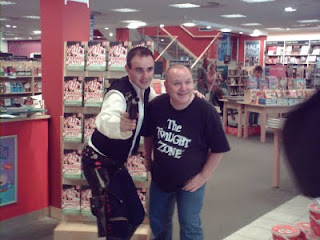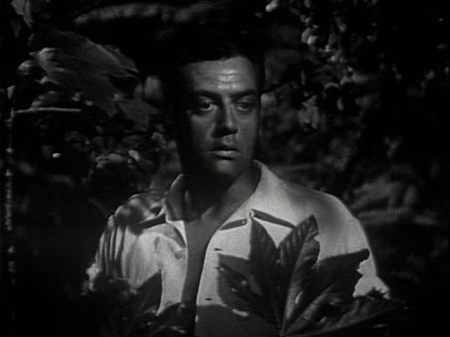 Title:
Title: Surveillance
Director: Jennifer Lynch
Released: 2008
Staring: Julia Ormond, Bill Pullman, Pell James, Ryan Simpkins, French Stewart, Kent Harper, Michael Ironside
Rating: 3 / 5
Plot: Two FBI Agents Anderson (Ormond) and Hallaway (Pullman) are brought in to help deal with the aftermath of a violent roadside rampage, were the only survivors are a cop (Harper), a Junkie (James) and a young girl (Simpkins) and each of them has a different tale to tell, as the agents attempt to discover what happened.
Review: When you’re the child of someone famous there, is always going to be that shadow which your parent casts over any project you choose to undertake, which bares any similarity to thier own, which often makes it all the more harder for your work to be recognised, for your own individual merit rather than being seen as simply cashing in on your namesake. This more recently has lead to several of these second generation Writers / Directors choosing to take on alias’s for their work, as is especially the case with Joe Hill, whose breakthrough novel “Heart Shaped Box” might have been viewed with a more jaded critical view, had he announced that he was in-fact the son of Stephen King and to his credit only really revealed this, when comparisons were drawn between his work and that of his fathers. Still for one reason or another Jennifer Lynch choose to instead stick with her real name, making for an interesting career move, especially when you consider the fact that her dad David Lynch, is a director with an extremely rabid fan base, as well as being largely renown for his surreal style of film making (aswell as selling his own coffee and performing his own LA Weather reports on his website), making it even less of a surprise that upon the release of her debut film “Boxing Helena” (1993) that numerous comparisons were drawn between the two, with many of those same jaded critics, writing her film off as an attempt to imitate her fathers style. Still fifteen years later she has returned to the director’s chair to take another shot, at making a name for herself as a director.

Hitting the ground running with a series of quick cuts, breaking up her title cards we bare witness to the graphic attack of a couple by a figure, whose features seem horribly mutilated, which certainly grabs the audience while it also feels almost as if Lynch is laying out a forewarning of exactly what kind of movie this will be, while certainly not being afraid of holding back, which could also been seen as Lynch going for double or quits with this film, by bombarding the viewer with this violent and disturbing imagery, which continues throughout the film.
From here we are introduced to the two FBI agents, whose relationship seems to be friendly but certinaly not on the same flirty level as The X Files's Mulder and Scully, who are bizarrely always the first people I think of whenever I hear the words “FBI Agent”, but those well known agents are a whole world away from Agents Anderson and Hallaway, who only speak the minimum amount of words to each other, while generally being devoid of any small talk of any form, preferring a straight to the point attitude. The casting of Ormand and Pullman as the agents feels like a good choice, even if Pullman is especially creepy here, while also appearing to have suffered some kind of stroke, seeing how facial expressions seem for some reason a challenge to him here, as he pretty much keeps the same spaced out expression throughout the film.
Upon arriving at the police station, were the remaining three survivors are being held, it is clear that, this area is certainly not used to seeing crimes of this nature, seeing how shocked everyone comes across, no doubt the result of having to patrol the same desert highways their jurisdiction covers. It is also here that the main meat of the story begins, as each of the three survivors regale their versions of what has happened while being watched constantly by Agent Hallaway, who uses a series of surveillance cameras, to watch each of the rooms, listening in to what each person has to say.
These three stories are all intercut with each other, slowly piecing together what has happened, as we see each of the characters paths as they cross, in the lead up to the massacre. What is interesting with these stories is how Lynch has chosen to shoot them, with Bobbi claiming to have been on her way to a job interview when she was actually scoring drugs, with Lynch skilfully editing flashback footage with her statement, so that her words end up take on a metaphorical meaning, while meanwhile it soon become clear through these same techniques, that Officer Bennet is not as clean cut as he makes out, as we watch him and his former partner Officer Conrad (Stewart) flaunt the law for their own person amusement, to the point were they make the cops from “Superbad” seem like upstanding officers of the law, as they abuse their powers of authority at any given opportunity, with their favourite game being to shoot out the tyres on passing cars, so that they can then play mind games with the drivers, with their own extreme version of good cop, bad cop. It’s these scenes in particular which make for especially uncomfortable viewing, as they torment and tease their victims, never once caring about their actions, seeing themselves in many ways as a kind of untouchable presence. Stewart is particularly convincing as Officer Conrad, having finally shrugged off his goofy comedy sidekick typecasting, which he has carried with him the last few years, since playing Harry on “Third Rock From The Sun” and here he seems to excel when having given the freedom to do something different, though it could just be another example of comedians making really good psycho’s, a prime example of which being Robin Williams in “One Hour Photo” (2002) which creeps me out just thinking about it.

The side of the story comes from Stephanie, who having just witness her whole family being killed in front of her doesn’t appear to be overly shocked, by what she has witness, as she calmly tells her story to Agent Anderson, which could in many ways be down to Simpkins performance as Stephanie, who Lynch apparently based on her own daughter. True I can understand the need to include a character who represents innocence in this dark and corrupted world that Lynch has created for her characters, but Simpkins for the most part just comes of more irritating than anything else, which seems to a frequent problem recently I found with directors, wanting to include these innocent child characters, only for them to annoy the hell out of the viewer, as was especially the case with “Sunshine Cleaning” (2009).
While I'm finding fault with this film, I should also mention that this film is also especially slow moving, despite having a brisk 99 minute running time, which it certainly felt longer than, as Lynch take her time to slowly revel the truth behind what has happened, before pulling a slick twist ending which did seem slightly more timid when compared to the really twisted original ending, she intended to use and which appears as an extra on the DVD, for the more curious amongst you.
On a fanboy kind of note, Michael Ironside is great for his brief amount of screen time he receives; as he plays the role of Capt. Billings almost effortlessly as he continues to prove that he really is the less costly version of Jack Nicolson and despite his presence being brief he still manages to make his character feel necessary to the main storyline.

Although “Surveillance” might have been more warmly received than her debut, it still bares many finger marks of her father’s work (who incidentally is also the executive producer), giving the film at times a surreal feeling though, certainly not placing the film in the same dreamlike world, that his films tend to inhabit, which might still keep her in his shadow, but it is certainly an impressive return and one which hopefully marks the start of more and equally interesting work to come.
 Ok so it seems that enough of you, thought that the idea of "Pride and Prejudice" with added zombies, was a good enough reason to hand over you hard earned cash, I know I was certainly one of those folks who thought it sounded like a fun idea and to an extent it was, but sadly if you remember my review , you will know already that it was a joke that got stretched a little too thin, with most of the added material working well with Mr. Darcy being turned into a super slayer of the zombie hordes, as well as finally giving the reader a reason for the military being stationed so close by. Where it failed though I felt was mainly with the sisters being trained in Martial arts and the numerous references to training undertaken, with wise old masters which really didn't fit into the world being created, unlike the zombie hordes which surprisingly worked really well, but overall the experience left the reader, with the feeling of a joke being streched alittle too thin.
Ok so it seems that enough of you, thought that the idea of "Pride and Prejudice" with added zombies, was a good enough reason to hand over you hard earned cash, I know I was certainly one of those folks who thought it sounded like a fun idea and to an extent it was, but sadly if you remember my review , you will know already that it was a joke that got stretched a little too thin, with most of the added material working well with Mr. Darcy being turned into a super slayer of the zombie hordes, as well as finally giving the reader a reason for the military being stationed so close by. Where it failed though I felt was mainly with the sisters being trained in Martial arts and the numerous references to training undertaken, with wise old masters which really didn't fit into the world being created, unlike the zombie hordes which surprisingly worked really well, but overall the experience left the reader, with the feeling of a joke being streched alittle too thin.



.JPG)











































